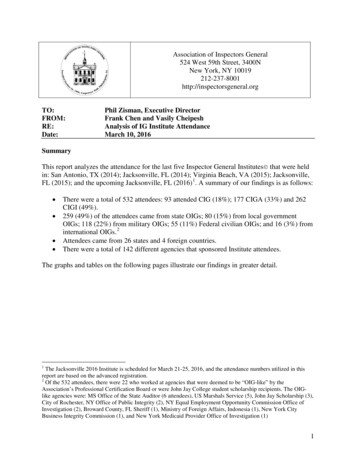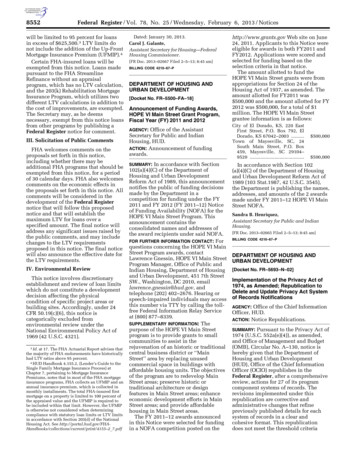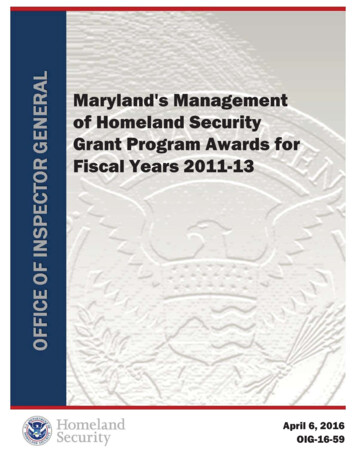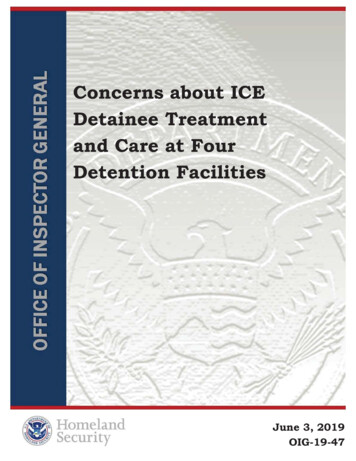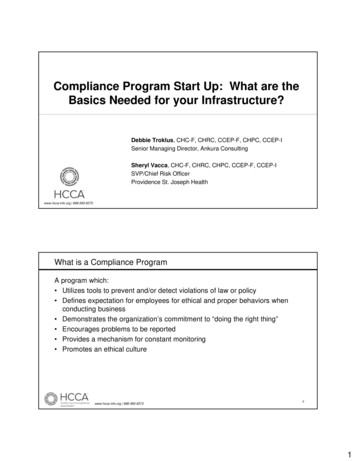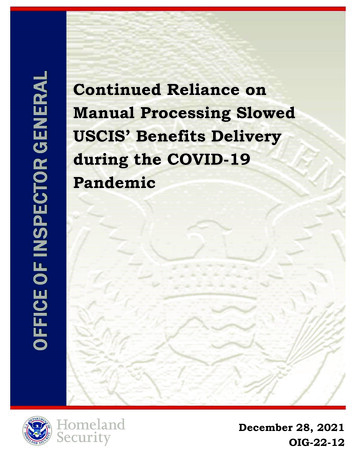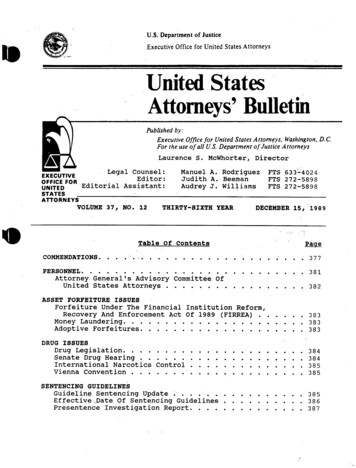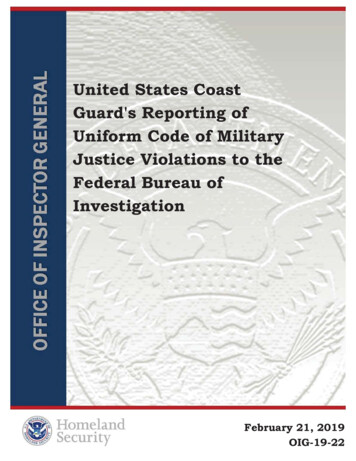
Transcription
United States CoastGuard's Reporting ofUniform Code of MilitaryJustice Violations to theFederal Bureau ofInvestigationFebruary 21, 2019OIG-19-22
OFFICE OF INSPECTOR GENERALDepartment of Homeland SecurityWashington, DC 20528 / www.oig.dhs.gov)HEUXDU\ MEMORANDUM FOR:The Honorable Admiral Karl L. SchultzCommandantUnited States Coast GuardFROM:John V. KellyActing Inspector GeneralSUBJECT:United States Coast Guard’s Reporting of Uniform Codeof Military Justice Violations to the Federal Bureau ofInvestigationAttached for your action is our final report, United States Coast Guard’sReporting of Uniform Code of Military Justice Violations to the Federal Bureau ofInvestigation. We incorporated the formal comments provided by your office.The report contains eight recommendations aimed at improving the U.S. CoastGuard’s reporting of prohibited individuals to the Federal Bureau ofInvestigation. Your office concurred with all recommendations. Based oninformation provided in your response to the draft report, we consider sevenrecommendations resolved and open and one recommendation closed. Onceyour office has fully implemented the recommendations, please submit a formalcloseout letter to us within 30 days so that we may close the recommendations.The memorandum should be accompanied by evidence of completion of agreedupon corrective actions. Please send your response or closure request toOIGSREFollowup@oig.dhs.gov.Consistent with our responsibility under the Inspector General Act, we willprovide copies of our report to congressional committees with oversight andappropriation responsibility over the Department of Homeland Security. We willpost the report on our website for public dissemination.Please call me with any questions, or your staff may contactJennifer L. Costello, Deputy Inspector General, or Erika Lang, Chief Inspector,at (202) 981-6000.www.oig.dhs.gov
DHS OIG HIGHLIGHTSUnited States Coast Guard’s Reporting ofUniform Code of Military Justice Violations tothe Federal Bureau of InvestigationFebruary , 2019Why We DidThisInspectionOn November 6, 2017,Devin Patrick Kelley, aformer Air Force servicemember, killed 26 peoplein Sutherland Springs,Texas. He was able topurchase firearmsbecause the Air Forcefailed to enter him intothe FBI’s National InstantCriminal BackgroundCheck System (NICS)database as required,based on a previousconviction. In light of thisevent, we reviewedwhether the United StatesCoast Guard properlyreported service membersto the FBI.What WeRecommendWe made eightrecommendations toenhance Coast Guard’spolicies and strengtheninternal controls.For FurtherInformation:Contact our Office of Public Affairsat (202) 981-6000, or email us hs.govWhat We FoundWe intended to verify whether Coast Guard is properly reportingservice members who are prohibited from possessing a firearm(“prohibited individuals”) to the Federal Bureau of Investigation (FBI).However, in comparing relevant databases with data in NICS, weidentified several issues that led us to question the reliability of CoastGuard’s data. First, the databases do not track whether a violation oroutcome of a case falls under one of the prohibited categories orwhether investigators actually followed through on reportingprohibited individuals to the FBI. Second, Coast Guard’s LawManager database, in part used to track military justice cases, doesnot contain complete information, including sentence or verdictinformation, which hindered our ability to determine whether servicemembers were guilty of a crime that would make them prohibitedindividuals. Finally, we identified NICS entries that did not havematching information in Law Manager, leading to concerns that othercases were not properly recorded. As a result, we could not determinethe full scope of prohibited individuals or verify that Coast Guardproperly reported prohibited individuals.Despite our concerns about the quality of Coast Guard’s data, weidentified 210 service members who committed offenses that madethem prohibited individuals. Of these 210, Coast Guard did not enter16 service members (8 percent) into NICS. This underreportingoccurred because Coast Guard policy did not include a requirement toinform the Coast Guard Investigative Service (CGIS) about allindividuals referred for trial by general court martial, and becauseCGIS’s current reporting process does not allow investigators in fieldoffices to have direct access to NICS. Coast Guard has since updatedits Military Justice Manual in March 2018 so that Coast Guardattorneys must provide information to CGIS investigators at the timean individual is referred for trial by general court martial. CoastGuard is also considering procuring a distributed network of “bookingstations” to allow field investigators to access NICS, but had not doneso as of October 2018.U.S. Coast Guard ResponseCoast Guard concurred with all of our recommendations and describedthe corrective actions it has taken and plans to take. We considerseven recommendations resolved and open and one recommendationclosed. OIG-19-
OFFICE OF INSPECTOR GENERALDepartment of Homeland SecurityBackgroundIn November 2017, Devin Patrick Kelley, a former Air Force service member,killed 26 people in Sutherland Springs, Texas, using a semiautomatic rifle. Mr.Kelley was court-martialed and convicted of assaulting his spouse and infantchild in 2012, which should have precluded him from being able to purchase afirearm. However, the Air Force failed to report Mr. Kelley’s conviction to theFederal Bureau of Investigation (FBI) as required, and therefore, his name wasnot listed as a “prohibited individual”1 in the National Instant CriminalBackground Check System (NICS), the system through which firearms vendorsrequest criminal background checks on potential purchasers.Immediately following the Sutherland Springs incident, Congress asked theUnited States Coast Guard (Coast Guard) whether it had reported all courtmartialed service members to the FBI. In response, Coast Guard noted that ithad failed to report 13 of 80 (16 percent) individuals with court martialconvictions from 2012 to 2017, but that it had corrected these discrepanciesand reported all court-martialed service members to the FBI as of November2017. Given the significant public interest in keeping guns away fromindividuals with a high risk of committing violence, we initiated this review toverify whether Coast Guard is properly reporting all applicable categories ofprohibited service members.Since 2008, Federal agencies, including Coast Guard, have been required toprovide relevant information to the FBI on 10 categories of prohibitedindividuals.2 Of these 10 categories of individuals, Coast Guard is responsiblefor reporting 7,3 including any individual who:1. is an unlawful user of or addicted to any controlled substance;2. is under indictment for a crime punishable by imprisonment exceeding 1year (i.e., a felony);3. was convicted of a crime punishable by imprisonment exceeding 1 year;1The Brady Handgun Violence Prevention Act of 1993 (Brady Act) prohibits certain individualsfrom possessing or receiving a firearm (18 United States Code (U.S.C.) § 922(g)(1)–(9), 922(n)).2 Pub. L. No. 110–180, I, § 101, 121 Stat. 2559, 2561 (2008). When queried, NICS checks threedatabases (National Crime Information Center (NCIC), Interstate Identification Index (III), andNICS Index) for individuals who may fall into the categories of prohibited individuals. If anindividual is identified as prohibited in any of the three databases, then NICS notifies the firearmsvendor. U.S. DEP’T OF JUSTICE, FED. BUREAU OF INV., CRIMINAL JUSTICE INFO. SERV. DIV.,NAT’L INSTANT CRIMINAL BACKGROUND CHECK SYS. (NICS) OPERATIONS, 1 (2016).3 The other three categories of prohibited individuals are those who (1) are illegal or unlawfulaliens; (2) have renounced U.S. citizenship; or (3) are subject to a restraining order forharassment, stalking, or threatening an intimate partner or child of intimate partner. Agenciesother than Coast Guard report these individuals to the FBI.www.oig.dhs.gov2OIG-19-
OFFICE OF INSPECTOR GENERALDepartment of Homeland Security4.5.6.7.was discharged from the Armed Forces under dishonorable conditions;4is a fugitive from justice (i.e., escaped confinement);was adjudicated mental defective or committed to a mental institution; orwas convicted of a misdemeanor crime of domestic violence.5Because Coast Guard is a branch of the armed forces, its service members aresubject to the Uniform Code of Military Justice (UCMJ), which is the basis ofUnited States military law. UCMJ violations include common law crimes, suchas robbery, as well as crimes specific to the military, like desertion and conductunbecoming an officer. The Coast Guard Investigative Service (CGIS)investigates service members who are accused of committing such violations,and Coast Guard attorneys and the Office of Military Justice (OMJ) are thenresponsible for overseeing military judicial action taken in response to thefindings of an investigation.6CGIS investigators and Coast Guard attorneys track their activities throughseparate databases. CGIS investigators use a case management system calledthe Field Activity Case Tracking System (FACTS) to track their investigationsfrom intake to final resolution. FACTS includes subject information, when theUCMJ violation occurred, the type of violation, and the date the violation wasreported. Attorneys use an internal database called Law Manager to trackindividual cases through the military justice process, capturing informationsuch as the charges, the verdict, and the punishment. Once Coast Guardattorneys inform CGIS investigators about such determinations, theinvestigators are responsible for entering information into NICS on prohibitedindividuals, such as name, date of birth, gender, race, social security number,and the reason for their prohibition. CGIS investigators can enter informationduring the course of an investigation if they determine a service memberunlawfully used or was addicted to a controlled substance, or was a fugitivefrom justice.This report addresses (1) data reliability issues that impeded identification ofprohibited individuals and (2) Coast Guard’s underreporting of prohibitedindividuals to the FBI. See appendix A for information on our scope andmethodology.4 Discharges under dishonorable conditions include dishonorable discharges of enlistedpersons and noncommissioned warrant officers, and dismissals of commissioned officers andwarrant officers, cadets, or midshipmen. The Brady Act prohibition does not apply to any otherpunitive discharge or separation from the armed forces, such as bad conduct discharges (Rulesfor Courts-Martial, § 1003(b)(8) (2016)).5 The application of these categories to members of the armed forces is specified in 62 Fed. Reg.34634 (June 27, 1997).6 In this report, “Coast Guard attorneys” refers to trial counsel who prosecute courts-martial.www.oig.dhs.gov3OIG-19-
OFFICE OF INSPECTOR GENERALDepartment of Homeland SecurityCoast Guard Data Reliability Issues Impede Identification ofProhibited IndividualsWe intended to verify whether Coast Guard is properly reporting all categoriesof prohibited individuals to the FBI, by comparing data on prohibitedindividuals from FACTS and Law Manager with data from NICS for the periodfrom January 2014 to March 2018.7 However, we identified a number of issuesthat led us to question the reliability of Coast Guard’s data. Such issuesinclude Coast Guard not tracking all relevant information regarding prohibitedindividuals, missing and incomplete information on the outcome of each casein Law Manager, and NICS entries lacking correspondence with entries in LawManager. As a result, we could not determine the full scope of prohibitedindividuals or verify that Coast Guard properly reported prohibited individualsto the FBI and to Congress.In response to our request for UCMJ violation and adjudication data, CoastGuard provided us with electronic spreadsheets containing information fromthe two databases related to 2,268 Coast Guard service members who weresubject to investigative or military justice proceedings during the specifiedtimeframe. However, even though the CGIS investigators are ultimatelyresponsible for reporting prohibited individuals to the FBI, the investigators arenot required to record in their database whether they followed through on thisreporting requirement. Further, the data does not capture whether the violationor outcome of a case falls under one of the prohibited categories. For example,misdemeanor crimes of domestic violence is not a specific UCMJ violation sowe could not easily search the data to find service members who committedthis offense. Instead, we had to review evidence for cases involving the use ofphysical force, the attempted use of physical force, or the threatened use of adeadly weapon, and also determine whether the cases involved a domesticrelationship. As a result, to determine whether all prohibited individuals wereproperly reported, we had to review underlying case file information for relevantservice members, conduct multiple follow-up discussions with Coast Guardand FBI officials, and manually compare data in Coast Guard and FBIdatabases, an extremely time-consuming process. Coast Guard officials whoprepared the November 2017 response to Congress confirmed this assessment:it took four individuals about 1 week to complete the response, and theyreported having to rely on their own knowledge of the cases that they workedon to establish what they considered a complete list of prohibited individuals.We also found that Law Manager did not contain complete information on theoutcome of each case. In many instances the verdict, sentence, or both wereWe requested database information from calendar year (CY) 2014 through the first quarter ofCY 2018. While Law Manager data was available for the entire period, CGIS did not begin usingFACTS until July 2014. Therefore, we were only able to review FACTS data from July 2014 toMarch 2018.www.oig.dhs.gov4OIG-19- 7
OFFICE OF INSPECTOR GENERALDepartment of Homeland Securitymissing from the Law Manager data. The lack of the final verdict hindered ourability to determine whether service members were guilty of a crime that wouldmake them prohibited individuals. Without the sentencing information, wecould not determine whether the service member was dishonorably dischargedor dismissed, which would also make the service member a prohibitedindividual. For example, we identified 16 service members in Law Manager whowere potentially reportable based on their court martial offenses, but theverdict information for these individuals was missing. We were only able todetermine that Coast Guard properly reported the appropriate individuals tothe FBI after extensive rounds of conversations and cross-referencing of datawith Coast Guard and FBI officials. Coast Guard officials confirmed to us thatthey do not regularly audit Law Manager for accuracy or completeness ofinformation.Finally, we identified entries in NICS that did not have correspondinginformation in Law Manager, leading us to further question the accuracy ofinformation in Coast Guard databases. For example, NICS contained entries on15 service members who had been dismissed or dishonorably discharged.However, eight of these individuals were not recorded in Law Manager; the onlyreason we knew these individuals were dishonorably discharged is that wefound them in the FBI’s data. The fact that Coast Guard did not recorddishonorable discharges in its own database leads to concerns that other caseswere not properly captured.Coast Guard Underreported Prohibited Individuals to FBI as aResult of Policy and Process GapsDespite our concerns about the quality of Coast Guard’s data, of the 2,268service members in FACTS and Law Manager who were subject to investigationand/or adjudication of a UCMJ violation, we identified 210 service memberswho committed offenses that placed them in 1 of the 7 categories of prohibitedindividuals. Of these 210, Coast Guard did not enter 16 service members (8percent) into NICS. As described further in this section, this underreportingoccurred because Coast Guard policy did not include a requirement to informCGIS about all individuals referred for trial by general court martial, andbecause CGIS’s current reporting process does not allow investigators in fieldoffices to have direct access to NICS.www.oig.dhs.gov5OIG-19-
OFFICE OF INSPECTOR GENERALDepartment of Homeland SecurityCoast Guard Lacked Policy on Reporting Individuals Referred for aGeneral Court MartialOne of the categories of prohibited individuals includes those under indictmentfor a crime punishable by imprisonment exceeding 1 year (i.e., a felony). In theCoast Guard, OMJ referrals are similar to a civilian indictment — the findingthat there is enough evidence for a case to go to trial. Individuals are referredfor a specific type of court martial, called a general court martial, when theUCMJ violations are punishable by imprisonment exceeding 1 year. Therefore,service members referred to general court martial for certain offensespunishable by imprisonment exceeding 1 year are considered to be prohibitedindividuals.8 Our analysis determined that Coast Guard referred five servicemembers for a general court martial but did not inform CGIS about thesereferrals. Notification to CGIS is important because, as previously discussed,CGIS is responsible for entering prohibited individuals into NICS.Coast Guard referred the five service members in question for a general courtmartial for a variety of offenses, including drug use and possession, committinga sexual act without consent, unlawfully touching a service member who wasasleep, and making video recordings of private areas without consent anddistributing the recordings to other service members. CGIS had already notifiedthe FBI about four of these individuals for previous criminal behavior, but notfor their general court martial referrals. The remaining service member wasnever entered into NICS. The FBI confirmed in October 2018 that Coast Guardhad not reported this service member to the FBI even though he was still underreferral for a general court martial. We made Coast Guard aware of thisdiscrepancy; as a result, Coast Guard reported the individual to the FBI, andhe is now prohibited from possessing a firearm.OMJ officials told us that it was their “existing practice” to notify CGISinvestigators about referrals, but they determined that the attorneys were notconsistently doing so. As a result, Coast Guard updated its Military JusticeManual in March 2018 so that Coast Guard attorneys must provideinformation to CGIS investigators at the time an individual is referred for trialby general court martial.9 Specifically, the updated manual now states:Trial counsel will forward a copy of the charge sheet in any casewhere a convening authority refers charges for trial by a generalHowever, certain military-specific offenses, while punishable by imprisonment exceeding 1year, do not require entry of the service member into NICS as a prohibited individual. CompareU.S. Department of Defense Instruction No. 5505.11 (July 21, 2014) (for the list of UCMJoffenses reportable to the FBI, which does not include offenses such as absence without leaveor failure to obey order) with Manual for Courts-Martial United States, §§ 10(e)(2)(d), 16(e)(1)(2016) (for the maximum punishment for the same offenses).9 U.S. DEP’T OF HOMELAND SECURITY, U.S. COAST GUARD, COMDTINST M5810.1F,MILITARY JUSTICE MANUAL, 20.N.1 (2018).www.oig.dhs.gov6OIG-19- 8
OFFICE OF INSPECTOR GENERALDepartment of Homeland Securitycourt-martial to the servicing CGIS office for entry in theNational Instant Background Check System (NICS). The copy mustbe sent as soon as practicable after referral.Internal Process Does Not Provide Field Offices with Access to NICSCoast Guard’s internal process for reporting prohibited individuals to the FBIonly allows CGIS investigators in the Washington, D.C. field office to havedirect access to NICS databases. Investigators in the regional and other fieldoffices must submit requests through FACTS to the investigators inWashington, D.C., to enter prohibited individuals into NICS. We identified 15cases —all controlled substance offenses — where a field investigator failed tomake a request to the Washington, D.C. field office to enter the offense intoNICS or the Washington, D.C. investigators simply did not follow through onthe request to enter the offense into NICS. The investigators we spoke withacknowledged that these cases should have been entered into NICS andblamed the failure to do so on the lack of training. Specific cases includeservice members with fairly egregious drug abuse issues that would impedetheir ability to safely use a firearm. For instance, in one case, a seamanadmitted to using heroin and methamphetamine and to falsifying previousurinalysis tests. After being released from a treatment facility, he immediatelypurchased illegal drugs. In another case, a seaman confessed to using cocaine,marijuana, ecstasy, and prescription drugs while on active duty. As of October2018, the FBI confirmed to us that Coast Guard still had not reported 5 of the15 prohibited service members; Coast Guard has since resolved the unreportedcases. As a result of these reporting failures, CGIS has determined the currentprocess of the field forwarding requests to the Washington, D.C. office isinefficient and is considering procuring a distributed network of “bookingstations” to allow field office investigators to access NICS. However, adistributed network of booking stations will still require appropriate qualitycontrols to ensure accurate entries. Coast Guard began researching thepossibility of these booking stations in November 2017 but has not made anychanges to its internal process as of October 2018.RecommendationsWe recommend the Director, Coast Guard Investigative Service:Recommendation 1: Modify FACTS to allow CGIS investigators to (1) confirmthey reported prohibited individuals to the FBI and (2) identify the specificcategory of prohibited individual.www.oig.dhs.gov7OIG-19-
OFFICE OF INSPECTOR GENERALDepartment of Homeland SecurityWe recommend the Judge Advocate General, Coast Guard Office of MilitaryJustice:Recommendation 2: Provide additional training and guidance to attorneysregarding proper and complete data entry into Law Manager.10Recommendation 3: Establish routine quality control audits of the LawManager databases to ensure information is complete and updated.Recommendation 4: Modify Law Manager to allow attorneys to confirm theynotified CGIS investigators of prohibited individuals.We recommend the Director, Coast Guard Investigative Service:Recommendation 5: Ensure access to FBI databases for CGIS investigators inthe field.Recommendation 6: Provide additional training and guidance to CGISinvestigators in the field regarding proper data entry into FBI databases.Recommendation 7: Establish routine quality control audits of the FACTSdatabase to ensure information is complete and updated.We recommend the Director, Coast Guard Investigative Service and the JudgeAdvocate General, Coast Guard Office of Military Justice:Recommendation 8: Immediately perform a comprehensive review of allcriminal investigative and adjudicative databases and files to ensure allqualifying offenses have been reported to the FBI.Management Comments and OIG AnalysisCoast Guard concurred with all of our recommendations and is taking steps toaddress them. Appendix B contains a copy of Coast Guard’s managementresponse in its entirety. We also received and incorporated technical commentsas appropriate. We consider recommendations 1, 2, and 4 - 8 resolved and open.Recommendation 3 is closed. A summary of Coast Guard’s responses and ouranalysis follows.Coast Guard Response to Recommendation 1: Coast Guard concurred withthe recommendation. CGIS will evaluate the potential for modifying FACTSbased on the time and expense involved, no later than June 30, 2019. It willThe report previously incorrectly referred to “OMJ attorneys” in the recommendations, asreflected in Appendix B. We updated the language in the final report for accuracy.www.oig.dhs.gov8OIG-19- 10
OFFICE OF INSPECTOR GENERALDepartment of Homeland Securityreport the results, including potential alternative solutions at that time. CoastGuard anticipates completing this action by December 31, 2019.OIG Analysis: We consider these planned actions responsive torecommendation 1. We will close this recommendation when Coast Guardimplements a solution that amends FACTS or its use in such a way that allowsCGIS to track its reporting and quickly identify errors and omissions.Coast Guard Response to Recommendation 2: Coast Guard concurred withthis recommendation. OMJ will provide training to Coast Guard attorneys(specifically, trial counsel who prosecute courts-martial) on the proper entry ofinformation regarding prohibited persons in Law Manager. Coast Guardanticipates completing this action by June 30, 2019.OIG Analysis: We consider this planned action responsive to recommendation2. We will close this recommendation when we receive a copy of the trainingand verification that all trial counsel have received it.Coast Guard Response to Recommendation 3: Coast Guard concurred withthis recommendation. Coast Guard stated that OMJ has been conductingmonthly reviews and semi-annual leadership reporting of the Law Managerdatabase since June 2018. Coast Guard provided documentation describingthis process, as well as examples of communication to all stakeholders startingin October 2018 that described errors found in the database and requiredcorrective actions. Coast Guard requested the recommendation be closed.OIG Analysis: Coast Guard’s actions are responsive to recommendation 3; weconsider the recommendation closed.Coast Guard Response to Recommendation 4: Coast Guard concurred withthis recommendation. It expects to implement a database update by March 31,2019.OIG Analysis: We consider this planned action responsive to recommendation4. We will close this recommendation when we receive documentation verifyingthe Law Manager database has been updated to confirm CGIS notifications.Coast Guard Response to Recommendation 5: Coast Guard concurred withthis recommendation. CGIS will evaluate expanding field office access to FBIdatabases no later than June 30, 2019. It will report the results, includingpotential alternative solutions at that time. Coast Guard anticipates completingthis action by December 31, 2019.OIG Analysis: We consider this planned action responsive to recommendation5. We will close this recommendation when Coast Guard implements awww.oig.dhs.gov9OIG-19-
OFFICE OF INSPECTOR GENERALDepartment of Homeland Securitystreamlined process for entering prohibited individuals identified by fieldinvestigators into FBI databases, as well as related quality control measures.Coast Guard Response to Recommendation 6: Coast Guard concurred withthis recommendation. It expects to train field investigators regarding properdata entry by June 30, 2019.OIG Analysis: We consider this planned action responsive to recommendation6. We will close this recommendation when we receive a copy of the trainingand verification that all field investigators have received it.Coast Guard Response to Recommendation 7: Coast Guard concurred withthis recommendation. It expects to establish routine audits of the FACTSdatabase by June 30, 2019.OIG Analysis: We consider this planned action responsive to recommendation7. We will close this recommendation when we receive documentationconfirming Coast Guard has established routine audits of the FACTS database.Coast Guard Response to Recommendation 8: Coast Guard concurred withthis recommendation. It expects to easily identify individuals who have beensentenced to a dismissal or dishonorable discharge since NICS was establishedin 1998. However, Coast Guard stated that in other prohibited categories, therewill be information gaps that Coast Guard cannot overcome. Specifically, formisdemeanor crimes of domestic violence, Coast Guard will only be able toaccess records back to 1998 on special courts martial that resulted in a badconduct discharge. Those records are maintained by the National Archives andRecords Administration; Coast Guard would have to retrieve and analyze theserecords to confirm the individuals were properly reported. Cases involvingdomestic violence that did not result in a bad conduct discharge are notpermanent records and would not be accessible as far back as 1998. CoastGuard anticipates providing an update to this analysis by June 30, 2019.However, it could not estimate a date for completion.OIG Analysis: We consider these planned actions responsive torecommendation 8. We acknowledge that this will be a time-consuming processand that there may be gaps in information available to determine someindividuals’ prohibited status. We also acknowledge that some prohibitions,such as individuals under indictment and unlawful users of controlledsubstances, expire and Coast Guard would have no way to retroactivelyconfirm whether the prohibitions were properly reported at the time. We willclose this recommendation when Coast Guard provides documentationconfirming all efforts were made to identify currently prohibited individuals andensure they are appropriately entered in FBI databases.www.oig.dhs.gov10OIG-19-
OFFICE OF INSPECTOR GENERALDepartment of Homeland SecurityAppendix AObjective, Scope, and MethodologyThe Department of Homeland Security Office of Inspector General (OIG) wasestablished by the Homeland Security Act of 2002 (Pub. L. No. 107ï296) byamendment to the Inspector General Act of 1978.The objective of the inspecti
Department of Homeland Security . Washington, DC 20528 / www.oig.dhs.gov )HEUXDU\ MEMORANDUM FOR: The Honorable Admiral Karl L. Schultz Commandant . United States Coast Guard FROM: John V. Kelly Acting Inspector General . SUBJECT: United States Coast Guard's Reporting of Uniform Code . of Military Justice Violations to the Federal Bureau of
